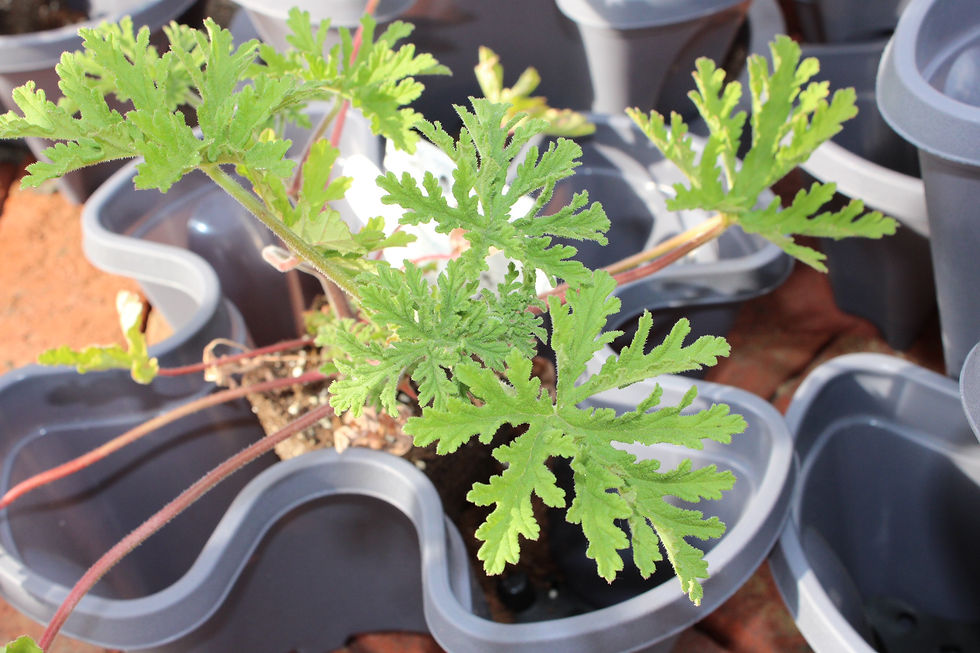How Citronella Plants Can Transform Your Battle Against Bugs
- Chelsea Stolte

- Apr 30, 2025
- 3 min read
Citronella plants are more than just visually appealing green decor. With their fresh scent, they are celebrated for their ability to repel bugs, particularly mosquitoes. As the evenings warm up, many find themselves fighting against these pesky insects. But how effective are these plants in your backyard? Let's explore the world of citronella and see how they can help you enjoy your outdoor spaces.
The Science Behind Citronella Plants
Citronella comes from two main species: Cymbopogon nardus and Cymbopogon winterianus. They belong to the grass family, featuring tall, slender leaves that can add beauty to any garden. The essential oils extracted from these plants contain compounds like citronellal, geraniol, and citronellol, which not only give citronella its refreshing fragrance but also act as irritants to flying insects.
Research indicates that citronella can reduce mosquito landings by up to 40% in an area within a few hours of application. This reduction highlights how effective citronella can be when used properly.

Growing Citronella: A Simple Guide
If you'd like to grow your own citronella plants, it is a straightforward process. These plants thrive in warm, sunny environments. Here are some essential tips to get you started:
Location: Find a sunny spot in your garden or patio where they can enjoy at least six hours of direct sunlight each day. This exposure is crucial for their growth and effectiveness.
Soil: Use well-draining soil enriched with compost. For best results, aim for a soil pH between 6.0 and 7.5 to ensure optimal nutrient absorption.
Watering: Water regularly, ensuring the soil remains slightly moist but not waterlogged. Aim for watering once a week, allowing the top inch of the soil to dry out between sessions.
Pruning: Prune your citronella plants regularly to encourage bushier growth. This not only helps maintain their appearance but also enhances their ability to repel insects.
By investing a little time and effort, you can create a lush citronella garden that beautifies your environment and provides natural insect control.
The Effectiveness of Citronella Against Bugs
The real question remains: how well do citronella plants work in keeping bugs at bay? Their effectiveness can depend on various factors:
Limited Range: The scent of citronella diminishes over distance. For optimal results, place the plants around areas where you gather outdoors, maintaining the strength of their aroma.
Concentration Matters: Citronella oil's concentration influences its repellent power. While the plants offer some protection, commercially available citronella products like candles and sprays often contain higher concentrations that can be significantly more effective.
Complementary Use: To maximize your defense against pests, combine citronella plants with other strategies. This includes using window screens, wearing light-colored clothing, and employing other natural repellents such as peppermint or eucalyptus.
In conclusion, while citronella might not eliminate all pests, it can significantly reduce their presence, especially when paired with additional protective measures.
Other Natural Bug Repellents
To enhance your natural bug-fighting arsenal, consider incorporating these plants into your garden:
Lavender: Not only does lavender smell wonderful, but it also effectively repels mosquitoes and moths. Planting a few lavender bushes can improve the aesthetics of your garden while providing a natural barrier against pests.
Marigolds: Known for their bright colors, marigolds can release natural compounds that deter various insects, including aphids and nematodes.
Basil: This culinary staple does double duty as it can help repel flies and mosquitoes as well. Plus, fresh basil adds flavor to your dishes.
Creating a garden filled with these bug-repelling plants means you'll enjoy both beauty and function, providing a natural defense against unwanted visitors.
Citronella in Action: How to Use It Effectively
To truly harness the benefits of citronella, consider these practical tips:
Essential Oil Diffusers: When spending time outdoors, use diffusers with citronella essential oils to spread the fragrance across your gathering area effectively.
Homemade Sprays: Create a simple natural bug spray by combining a few drops of citronella oil with water and witch hazel. This mixture can be applied around patios, decks, or wherever you enjoy outdoor activities.
Candles and Torches: Lighting citronella candles or torches during evening gatherings can help keep pesky insects away while enhancing the atmosphere.
These strategies can create a more enjoyable outdoor experience, free from the disturbance of buzzing bugs.
Final Thoughts
Citronella plants provide a natural and eco-friendly option for keeping bugs at bay in your living spaces. Although they may not be the ultimate solution, their lovely scent and insect-repelling properties make them an excellent addition to your outdoor strategy. By incorporating citronella plants into your garden and using their oil in various ways, you can transform how you enjoy your time outside.
Embrace this natural approach and savor peaceful evenings under the stars, far from the annoyance of insects!




Comments